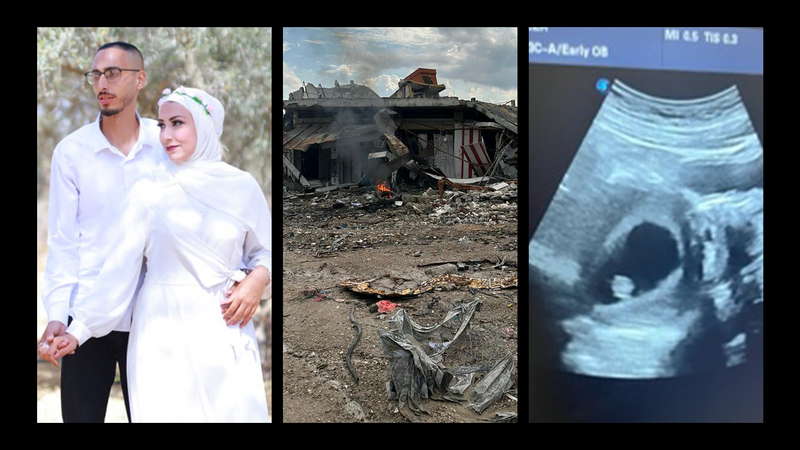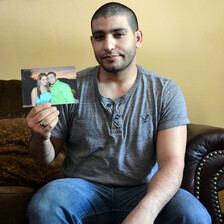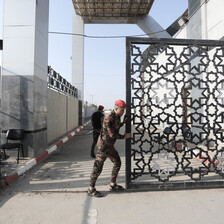The Electronic Intifada 25 October 2024

From left to right: The author’s wedding day, the author’s family home and the couple’s ultrasound.
Since the start of the Gaza genocide in October 2023, I have been displaced several times.
Every house I went to was bombed with me inside.
I’ve survived death more than five times and lost relatives and loved ones, watching them torn apart before my eyes.
I slept fully dressed, in my mother’s embrace, fearing death.
My fiancé Safiq was stuck in the southern part of the Gaza Strip. But communications were cut off by the Israeli occupation forces. I lived in fear every minute, desperately wanting to know if he was OK.
I was torn between staying with my family in the north and facing death, or going to my fiancé and seeking safety. I thought the south was safer, and that I could get there without much trouble, reunite with him, and start a life together, full of love, as we created a family.
Unfortunately, it was not that easy.
I went south in December.
My journey there is something I will never forget.
I walked over corpses left in the streets.
A person next to me was shot and killed by a sniper.
I will never forget his mother’s grief. She was right there to witness her son’s execution.
Struggling for shelter
When I finally made it south, my fiancé and I struggled to find a place to stay, due to the sheer number of displaced people. At times, we were even kicked out of houses and left on the street, with no shelter.
We suffered, unable to find a place to get married or settle.
After months of this, I was forced to live alone in a tent in Rafah, while he stayed at a friend’s place in Deir al-Balah.
We suffered. We couldn’t bear to live apart, especially since I was alone without my family or any source of security or support.
Sadiq was in a terrible state knowing I was alone in a tent, sleeping on the sand with stray cats, dogs and insects.
I suffered alone.
I fought illnesses alone.
I received the news of the martyrdom of several family members, including my grandparents and my nephew Mahdi, 11, along with his mother, my sister-in-law, all while alone.
I think of Mahdi’s five siblings and I grieve for them, growing up without their mother.
I do so alone.
The wedding
Sadiq always told me: “My love, you are a queen. You deserve nothing but love and pampering.”
He worked tirelessly for a month to find shelter and insisted that we marry on 5 May. He even rented a house for us for a shocking $1,000 a month.
We were defying all the odds, all those who said it would be too difficult. We were defying genocide.
But I never imagined getting married far from my family, friends and home.
The day before the wedding, I spent the night crying uncontrollably. I can’t describe how I felt. I picked a simple wedding dress on my own, put it on alone inside the tent and got ready by myself.
I had to prepare for the wedding day alone. No one shared those precious moments with me.
That night, fortunately, there was a phone signal. I called my mother, crying: “What did I do to deserve all this hardship?”
On the wedding day, Sadiq picked me up in my simple wedding dress. I hugged him and cried deeply. We went to a small gathering with about 10 members of his family who wanted to celebrate.
I smiled, but it was a fake smile hiding my tears.
I realized that being an orphan isn’t just losing your parents. Being an orphan can also mean having parents who are alive but far from you, unable to be with you in your sad or happy moments.
New life
Before going to my husband’s house, I wept loudly, a cry that could be heard by everyone. The pain is unimaginable to anyone who hasn’t lived through it.
On our wedding night, the house next to us was destroyed by Israel’s bombs.
We couldn’t even enjoy that moment.
Sadiq has been my love for 12 years. As our relationship developed, we imagined every detail of our wedding day. We had no idea that circumstances would bring us to this.
Just a few days after the wedding, I found out I was pregnant. I was overjoyed at the thought of becoming a mother, but I continued to suffer. I couldn’t share this happiness with my family or friends. I struggled without access to medicines or hospitals.
I also struggled with being alone, with no mother to care for me, no one to take me to the hospital when I needed to go, no one to offer advice.
I am terrified about giving birth.
How will I bring this child into the world in these circumstances?
Where will I give birth?
What will I do?
This truly is a war of extermination.
Alaa Hassouna is an engineer who before last October worked managing the largest shopping mall in Gaza, now destroyed.


